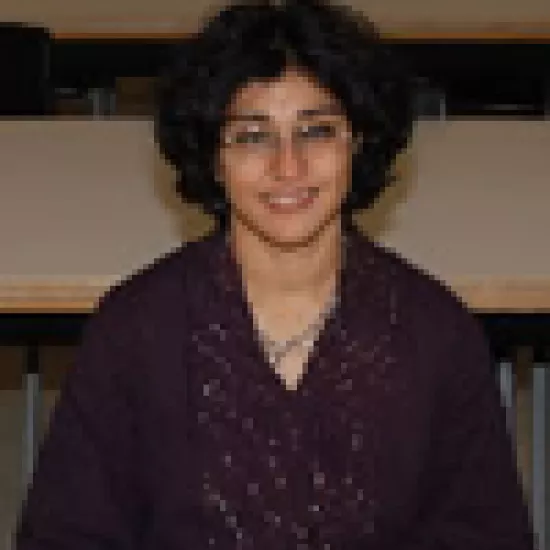
Malavika Kasturi
-
E-mail:
-
Room:MN 4288
-
Office Hours:Please refer to the syllabus and/or contact via email.
-
Mailing Address:
3359 Mississauga Road, Maanjiwe nendamowinan, 4th floor
Mississauga, ON L5L 1C6
Canada
Biography:
Malavika Kasturi teaches South Asian history in the Department of Historical Studies and is graduate faculty at the Department of History and the Centre for the Study of Religion. Dr. Kasturi’s first monograph, Embattled Identities, Rajput Lineages and the Colonial State in Nineteenth Century Colonial North India (Oxford University Press, 2002) and related articles analyzed the reconstitution of the family and martial masculinities amongst elite lineages in British India, against the backdrop of colonial ideologies, political culture, and material realities. Her research interests include gender and households, monasticism and asceticism, religion and the public sphere, Hindu nationalism, and urban history and public memory.
Dr. Kasturi is currently finalizing a book manuscript for publication entitled Gurus and the Making of Hindutva in Twentieth Century India, which explores the intersection of monasticism with a host of political bodies espousing visions of the Hindu ‘nation’. This project was funded by a Social Sciences and Humanities Research Council (SSHRC) Standard Research Grant.
Dr. Kasturi is also working on two other research projects. After completing her second book manuscript, she will continue to write about various aspects of monasticism, with a particular focus on family, sexuality, and asceticism. Her second project, The ‘Lost’ Mughal Pensioners of Banaras: Diasporic’ Families, Memory and Urban History in South Asia, 1800 to the Present, also funded by a SSHRC Insight grant (2015), studies how elite Muslim households have shaped urban space and a cosmopolitan public culture in ‘Hindu’ pilgrimage centres in recent times. Dr. Kasturi’s articles have appeared in edited collections and in journals such as the Journal of Hindu Studies, Modern Asian Studies, the Indian Economic Social and History Review, Studies in History, and the Indian Journal of Gender Studies. She has been a research fellow at the Agrarian Studies Programme, Yale; the Indian Institute of Advanced Study, Shimla; and the Centre for Contemporary Studies, Nehru Memorial Museum and Library, New Delhi.
Education:
PhD (University of Cambridge)
MPhil (Jawaharlal Nehru University, India)
MA (Jawaharlal Nehru University, India)
BA (Delhi University, India)
Specialization:
- Monasticism and asceticism
- Gurus and guru movements
- Religion and the public sphere
- Hindu nationalism
- Gender and households
- Urban history, memory, community
- Legal history
- Colonialism and British Empire
- Historiography
- Historical Anthropology
Publications:
- “Maths, Quotidian Conflict and Urban Property: Perspectives from the Legal Archives in Banaras”, in Farhana Ibrahim (ed.), Studies in Religion and Everyday Life, Oxford Studies in Contemporary Indian Society, (Oxford University Press, London/New York), pp. 1-31, 2024, https://global.oup.com/academic/product/studies-in-religion-and-the-everyday-9780198902782?cc=ca&lang=en&
- “Lineages, and Emerging Exemplars and Movements; Monasticism in the Public Domain in Late Colonial India,” (chapter 7) in Gwilym Beckerlegge (ed.), A Cultural History of Hinduism in the Age of Late Colonialism,(Bloomsbury Academic Press, London). Series on Cultural History of Hinduism, Karen Pechilis, Anthology Series Editor (2024 in press), https://www.bloomsbury.com/ca/cultural-history-of-hinduism-9781350024434/
- "Pir Ratannath in Devi Patan:” Nathyogis, Monastic Networks and Historical Memories Along the Anglo-Gorkha Frontier", 2021, special issue on “Death Matters” Samadhis, Relics and Dargahs in South Asia”, guest edited by Brian Hatcher, Abhishek Amar and Mark McLaughin, Journal of Hindu Studies, August 2021, 14: 2, pp. 121-48.
- "Gurus and Gifting: Dana, the Math Reform Campaign, and Hindu Sangathan in Twentieth Century India", in Special edition on Philanthropy in Modern South Asia edited by Fillipo Osella and Sumathy Ramaswamy, Modern Asian Studies, January 2018, 52:1, pp. 99-131.
- "Negotiating the Sacred in Twentieth Century Gorakhpur: the Nathyogis, the Gorakhnath Math and Contested Urban Space", in Narayani Gupta and Partho Datta (eds.), Urban Spaces in India (Indian Institute of Advanced Study, Shimla, 2018, pp.189-206.
- “This Land is Mine’: Mahants, Civil Law and Political Articulations of Hinduism in Twentieth Century North India", in G. Tarrabout, D. Berti and R. Voix (eds.), Filing Religion, State Hinduism and the Court, 2016, New Delhi, Oxford University Press.
- "Sadhus, Sampraday and Hindu Nationalism in the Early Twentieth Century’, The Dasnamis and the Bharat Dharma Mahamandala”, Nehru Memorial Museum Library Occasional Papers, August 2015, 1-61, http://pmml.nic.in/downloadSeries/333
- "The Lost and Small Histories of the City of Patronage, Poor Mughal Pensioners in Colonial Banaras", in M. Sinclair Dodson (ed.), Banaras, Urban Forms and Cultural History, Routledge, New Delhi, 2012, pp. 110-139
- “All Gifting is Sacred: The Sanatana Dharma Sabha Movement, Civil Society and the Reform of Dana in Late Colonial India". Indian Economic and Social History Review (IESHR), 47: 1, pp. 107-39, January-March 2010.
- “Asceticising Monastic Families”, Ascetic Genealogies, Property Feuds and Anglo-Hindu Law in Late Colonial India", Modern Asian Studies (MAS), 43: 4, pp.1039-83, September 2009.
- Embattled Identities: Rajput Lineages and the Colonial State in Nineteenth Century North India, Oxford University Press, 1st edition.
- "Rajput Lineages, Banditry and the Colonial State in Nineteenth Century British Bundelkhand,” Studies in History, 15;1, pp. 75-108, 1999.
- 1994: ‘Crime and Law: British Policy and the Female Infanticide Act of 1870’, Indian Journal of Gender Studies, 1:2, pp. 170-93, October 1994.
